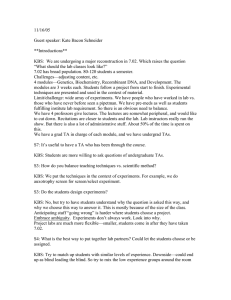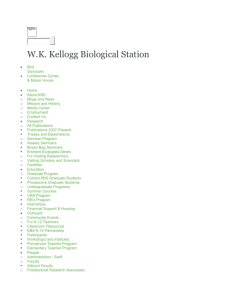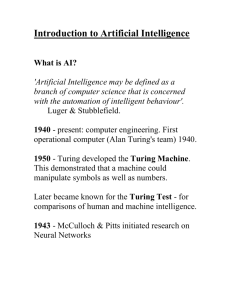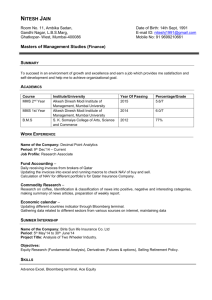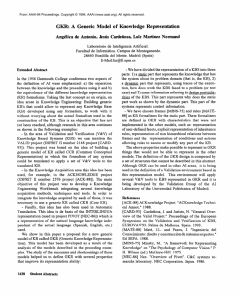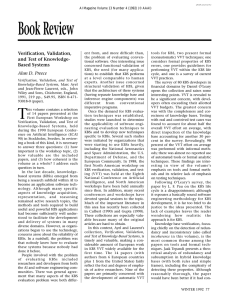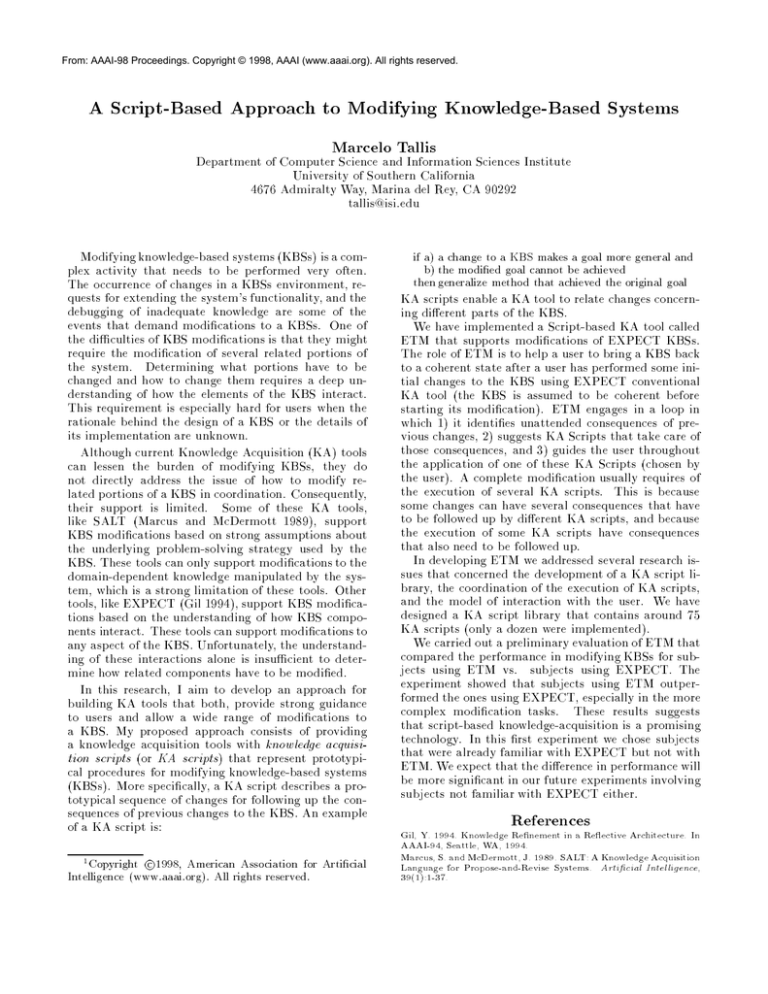
From: AAAI-98 Proceedings. Copyright © 1998, AAAI (www.aaai.org). All rights reserved.
A Script-Based Approach to Modifying Knowledge-Based Systems
Marcelo Tallis
Department of Computer Science and Information Sciences Institute
University of Southern California
4676 Admiralty Way, Marina del Rey, CA 90292
tallis@isi.edu
Modifying knowledge-based systems (KBSs) is a complex activity that needs to be performed very often.
The occurrence of changes in a KBSs environment, requests for extending the system's functionality, and the
debugging of inadequate knowledge are some of the
events that demand modications to a KBSs. One of
the diculties of KBS modications is that they might
require the modication of several related portions of
the system. Determining what portions have to be
changed and how to change them requires a deep understanding of how the elements of the KBS interact.
This requirement is especially hard for users when the
rationale behind the design of a KBS or the details of
its implementation are unknown.
Although current Knowledge Acquisition (KA) tools
can lessen the burden of modifying KBSs, they do
not directly address the issue of how to modify related portions of a KBS in coordination. Consequently,
their support is limited. Some of these KA tools,
like SALT (Marcus and McDermott 1989), support
KBS modications based on strong assumptions about
the underlying problem-solving strategy used by the
KBS. These tools can only support modications to the
domain-dependent knowledge manipulated by the system, which is a strong limitation of these tools. Other
tools, like EXPECT (Gil 1994), support KBS modications based on the understanding of how KBS components interact. These tools can support modications to
any aspect of the KBS. Unfortunately, the understanding of these interactions alone is insucient to determine how related components have to be modied.
In this research, I aim to develop an approach for
building KA tools that both, provide strong guidance
to users and allow a wide range of modications to
a KBS. My proposed approach consists of providing
a knowledge acquisition tools with knowledge acquisition scripts (or KA scripts) that represent prototypical procedures for modifying knowledge-based systems
(KBSs). More specically, a KA script describes a prototypical sequence of changes for following up the consequences of previous changes to the KBS. An example
of a KA script is:
1 Copyright c 1998, American Association for Articial
Intelligence (www.aaai.org). All rights reserved.
if a) a change to a KBS makes a goal more general and
b) the modied goal cannot be achieved
then generalize method that achieved the original goal
KA scripts enable a KA tool to relate changes concerning dierent parts of the KBS.
We have implemented a Script-based KA tool called
ETM that supports modications of EXPECT KBSs.
The role of ETM is to help a user to bring a KBS back
to a coherent state after a user has performed some initial changes to the KBS using EXPECT conventional
KA tool (the KBS is assumed to be coherent before
starting its modication). ETM engages in a loop in
which 1) it identies unattended consequences of previous changes, 2) suggests KA Scripts that take care of
those consequences, and 3) guides the user throughout
the application of one of these KA Scripts (chosen by
the user). A complete modication usually requires of
the execution of several KA scripts. This is because
some changes can have several consequences that have
to be followed up by dierent KA scripts, and because
the execution of some KA scripts have consequences
that also need to be followed up.
In developing ETM we addressed several research issues that concerned the development of a KA script library, the coordination of the execution of KA scripts,
and the model of interaction with the user. We have
designed a KA script library that contains around 75
KA scripts (only a dozen were implemented).
We carried out a preliminary evaluation of ETM that
compared the performance in modifying KBSs for subjects using ETM vs. subjects using EXPECT. The
experiment showed that subjects using ETM outperformed the ones using EXPECT, especially in the more
complex modication tasks. These results suggests
that script-based knowledge-acquisition is a promising
technology. In this rst experiment we chose subjects
that were already familiar with EXPECT but not with
ETM. We expect that the dierence in performance will
be more signicant in our future experiments involving
subjects not familiar with EXPECT either.
References
Gil, Y. 1994. Knowledge Renement in a Reective Architecture. In
AAAI-94, Seattle, WA, 1994.
Marcus, S. and McDermott, J. 1989. SALT: A Knowledge Acquisition
Language for Propose-and-Revise Systems. Articial Intelligence,
39(1):1-37.

